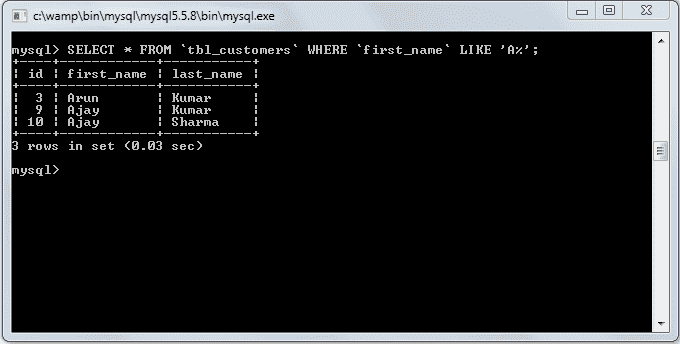MySQLi LIKE condition allows wildcards to be used in the WHERE clause of a SELECT, INSERT, UPDATE, or DELETE statement. This allows you to perform pattern matching.
Below the syntax of LIKE condition.
expression LIKE [ ESCAPE 'escape_character' ]MySQLi LIKE condition allows wildcards to be used in the WHERE clause of a SELECT, INSERT, UPDATE, or DELETE statement. This allows you to perform pattern matching.
Below the syntax of LIKE condition.
expression LIKE [ ESCAPE 'escape_character' ]<?php
$conn = mysqli_connect('localhost:3306', 'user_name', 'password', 'db_nexladder');
if(! $conn) {
die('Could not connect: ' . mysqli_error());
}
$sql = "SELECT `first_name` FROM `tbl_customers` WHERE `first_name` LIKE 'A%'";
$result = mysqli_query($conn, $sql);
if (mysqli_num_rows($result) > 0)
{
while($row = mysqli_fetch_object($result)) {
echo "Name: " . $row->first_name. "<br />";
}
} else {
echo "0 rows";
}
mysqli_close($conn);
?>Parameters:
| Wildcard | Explanation |
|---|---|
| % | Allows you to match any string of any length (including zero length) |
| _ | Allows you to match on a single character |
escape_character - Optional. It allows you to test for literal instances of a wildcard character such as % or _. If you do not provide the escape_character, MySQL assumes that "" is the escape_character.
Below it'll look like:
